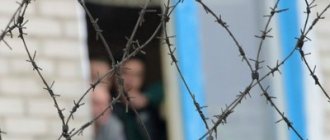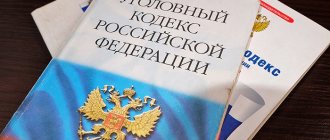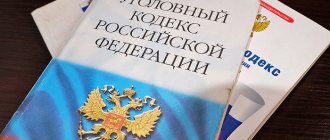Main types of punishments
The main types of punishments can be imposed by the court only as independent ones and cannot be added to other punishments. This or that main type of punishment can be imposed by the court only if it is directly enshrined in the sanction of the applicable article of the Special Part of the Criminal Code of the Russian Federation. An exception to this rule is Art. 64 of the Criminal Code of the Russian Federation, according to which, in the presence of exceptional mitigating circumstances, the court may impose a more lenient punishment than provided for this crime.
The main types of punishments include:
- compulsory work;
- correctional work;
- restriction on military service;
- forced labor;
- arrest;
- detention in a disciplinary military unit;
- imprisonment for a certain period of time;
- life imprisonment;
- the death penalty.
One of the features of the main types of punishment is that other main types of punishment cannot be added to one main type of punishment. So, for example, if a person is sentenced to imprisonment for committing one crime, and correctional labor for committing another, then to assign the final punishment it is necessary to resort to the provisions of Art. 71 of the Criminal Code of the Russian Federation, converting correctional labor into the ratio of imprisonment at the rate of one day of imprisonment to three days of correctional labor. If a person is sentenced to imprisonment for committing one crime, and a fine as the main type of punishment for committing another, then each of the imposed punishments should be carried out independently, since criminal law does not provide for the possibility of transferring a fine to other types of punishment.
The institution of early release from serving a sentence (conditional early release from serving a sentence, release from serving a sentence due to illness, replacing the unserved part of a sentence with a milder type of punishment) applies only to punishments assigned as main ones (but it is possible to release from serving and additional punishment).
Commentary to Art. 43 Criminal Code
1. Punishment is a measure of state coercion, which is one of the forms of implementation of criminal liability. With the help of punishment, the state forces the person who committed the crime to law-abiding behavior and compliance with criminal law prohibitions.
2. The goals of punishment in criminal law are understood as the final social results, the achievement of which is pursued by the establishment of punishments in criminal law.
3. Social justice is characterized by four aspects that express the interests of: a) the convicted person; b) the victim; c) society and d) state. Justice means proportionality between the crime a person committed and the punishment he suffered for it. According to the principle of justice, the court must impose a punishment that corresponds to the nature and degree of public danger of the crime, the circumstances of its commission and the identity of the perpetrator (Part 1 of Article 6 of the Criminal Code). At the same time, the goal of restoring social justice and the principle of justice are not identical. There is the same difference between them as between the final result, i.e. the goal towards which the legislator strives, and the means, i.e. the basic rules by which this goal can be achieved.
4. Correction of the convicted person in accordance with Art. 9 of the Penal Code of the Russian Federation is the formation of a respectful attitude towards a person, society, work, norms, rules and traditions of human society and the stimulation of law-abiding behavior (social correction). In criminal law, confirmation of the achievement of this goal is the person’s failure to commit new crimes after serving the sentence at least once or being released for some reason from serving it (legal correction).
5. The purpose of preventing the commission of new crimes is to deter persons from committing crimes through the threat of punishment or its actual application. Prevention of violations of criminal law prohibitions is possible both from persons who have already committed a crime and from other persons. In this regard, in the theory of criminal law, crime prevention is divided into private (private prevention) and general (general prevention).
Additional types of punishment
Punishments applied only as additional ones include only one type - deprivation of a special, military or honorary title, class rank and state awards. Additional punishment cannot be applied independently, without combination with the main ones. There is no indication of this type of punishment in any of the sanctions in the article of the Special Part of the Criminal Code of the Russian Federation. Therefore, the court can deprive a person of a special, military or honorary title, class rank and state awards if there is such a need for any serious or especially serious crime (Article 48 of the Criminal Code of the Russian Federation).
Commentary to Art. 44 Criminal Code
1. Article 44 of the Criminal Code presents a system of punishments, which is understood as an internally ordered, exhaustive list of types of punishments established by criminal law and mandatory for the legislator and the court.
2. The existence of the system is due to the fact that the set of types of punishments does not create confusion, they are arranged in a certain order from milder to more severe, i.e. the system is orderly in nature (the so-called ladder of punishment). This approach has important practical significance. Firstly, it is obligatory for the legislator when constructing alternative sanctions (they must be arranged in the same sequence: from the most lenient to the more severe). Secondly, for the law enforcement officer: courts are obliged to first consider the possibility of applying the most lenient, and then more severe punishment.
Punishments applied both as primary and additional
Punishments that can act as both primary and additional punishment include:
- fine;
- deprivation of the right to hold certain positions or engage in certain activities;
- restriction of freedom.
A fine and restriction of freedom as additional types of punishment can be imposed by the court only if they are provided for by the sanction of the applicable article of the Special Part of the Criminal Code of the Russian Federation. Deprivation of the right to hold certain positions or engage in certain activities as an additional punishment may be imposed even when it is not provided for by the sanction of the relevant article of the Special Part of the Criminal Code, if the court considers it inappropriate to preserve the convicted person’s right to occupy a certain position or engage in certain activities.
Second commentary to Art. 43 of the Criminal Code of the Russian Federation
1. Punishment is a measure of state coercion; its execution is ensured by the force of state power with the help of institutions specially created for this purpose.
2. Punishment includes the forced infliction of deprivations and restrictions of a moral, political, physical and property nature.
3. It applies only to a person found guilty of a crime, i.e. is strictly personal in nature.
4. The only procedural form of his appointment is a court conviction.
5. Punishment is of a public nature, it expresses state censure of the act and personality of the perpetrator. According to Art. 296 of the Code of Criminal Procedure of the Russian Federation, the court pronounces the verdict in the name of the Russian Federation. Criminal proceedings in all courts are open, with some exceptions provided for by law, although in these cases the verdict either in full or in its introductory and operative parts is still announced publicly (Article 241 of the Code of Criminal Procedure of the Russian Federation).
6. The goal of restoring social justice means maximum compensation for the harm caused by a crime to an individual, society and the state, through deprivation or restriction of rights corresponding to the gravity of the act committed and the identity of the perpetrator.
7. The goal of correction ideally means forming in the convicted person a respectful attitude towards a person, society, work, norms, rules and traditions of human society, stimulating law-abiding behavior.
8. The goal of preventing new crimes includes both special (preventing the convicted person from committing new crimes) and general prevention (preventing other persons from committing crimes).
Commentary to Art. 44 of the Criminal Code of the Russian Federation
In Art. 44 of the Criminal Code of the Russian Federation provides a list of punishments, arranged in a certain order. In practice, we are talking about a system of punishments, i.e. on a certain ordered list of types of punishments provided for by criminal law for committing crimes. The penal system most clearly reveals the nature and direction of the state’s criminal policy, which, in turn, depends on the socio-economic and political structure of the state, the state of crime, the level of public legal awareness, etc.
The punishment system is enshrined in Art. 44 of the Criminal Code of the Russian Federation and includes a list of 12 types of punishments: 1) fine; 2) deprivation of the right to hold certain positions or engage in certain activities; 3) deprivation of a special military or honorary title, class rank and state awards; 4) compulsory work; 5) correctional work; 6) restrictions on military service; 7) restriction of freedom; arrest; 9) detention in a disciplinary military unit; 10) imprisonment for a certain period; 11) life imprisonment; 12) death penalty.
This list is exhaustive; the court cannot impose any other punishment not included in this list. In Russian criminal legislation, in comparison with other states, the list of punishments is very extensive, which creates sufficient conditions for the court to individualize the imposition of punishment. Another thing is that some punishments provided for by the Criminal Code of the Russian Federation, alternative to imprisonment (restriction of freedom, arrest), have not yet been put into effect.
In the penal system, specific punishments are arranged in a certain sequence, as their severity increases - from a less severe punishment to a more severe one (the so-called “ladder of punishments”). In the sanctions of the articles of the Special Part of the Criminal Code of the Russian Federation, punishments are also arranged in sequence from less severe to more severe, which, in principle, should guide the courts in the issue of choosing a punishment. As noted in paragraph 2 of the Resolution of the Plenum of the Supreme Court of the Russian Federation dated January 11, 2007 No. 2 “On the practice of imposing criminal punishment by the courts of the Russian Federation,” in accordance with the general principles of imposing punishment (Article 60 of the Criminal Code of the Russian Federation), a more severe type of punishment from among provided for the crime committed is assigned only if a less severe type of punishment cannot ensure the achievement of the goals of punishment. If the sanctions of the criminal law provide for other types of punishment along with deprivation of liberty, the court decision to impose imprisonment must be motivated in the sentence.
———————————
Bulletin of the Supreme Court of the Russian Federation. 2007. N 4.
In the Criminal Code of the Russian Federation, the death penalty is included in the punishment system, but retains its exceptional character and can be imposed in accordance with Art. 20 of the Constitution of the Russian Federation only for especially serious crimes against life. But at present this punishment is not applied. From the moment of entry into force of the Resolution of the Constitutional Court of the Russian Federation of February 2, 1999 N 3-P and until the entry into force of the corresponding federal law, providing throughout the Russian Federation to everyone accused of a crime for the commission of which federal law established as an exceptional measure of punishment the death penalty, the right to have his case tried by a jury, the death penalty cannot be imposed regardless of whether the case is considered by a jury, a panel of three professional judges, or a court consisting of a judge and two lay judges .
———————————
NW RF. 1999. N 6. Art. 867.
The punishment system enshrined in Art. 44 of the Criminal Code of the Russian Federation, applies to adult convicts. For minors in Art. 88 of the Criminal Code of the Russian Federation provides its own list of six types of punishments: 1) fine; 2) deprivation of the right to engage in certain activities; 3) compulsory work; 4) correctional labor; 5) arrest; 6) imprisonment for a certain period. But the peculiarities of imposing punishment on minors lie not only in narrowing the list of punishments. For minors, compared to adults, the size and duration of imposed punishments are reduced (with the exception of deprivation of the right to engage in certain activities). In addition, there are special conditions for imposing certain punishments. Thus, a fine imposed on a convicted minor may be collected not only from him, but also from his parents or other legal representatives (with their consent). The most specific procedure for assigning punishment to minors is imprisonment for a certain period (Part 6 and Part 6.1 of Article 88 of the Criminal Code of the Russian Federation).
Judicial practice under Article 44 of the Criminal Code of the Russian Federation
Resolution of the Presidium of the Supreme Court of the Russian Federation dated June 20, 2018 N 64P18
Chernenko Konstantin Gennadievich, ... convicted: February 20, 1996 under Art. , part 2 art. 144, part 2 art. 144, part 1 art. 149, art. , Criminal Code of the RSFSR to 3 years of suspended imprisonment with a probationary period of 2 years; March 12, 1999 under Part 2 of Art. 108 of the Criminal Code of the RSFSR to 8 years in prison, on the basis of Art. Criminal Code of the RSFSR to 9 years in prison, on July 1, 2005, released on parole for 4 months 16 days, -
Appeal ruling of the Judicial Collegium for Criminal Cases of the Supreme Court of the Russian Federation dated January 22, 2020 No. 18-APU19-29
The court's conclusion to impose a sentence of long-term imprisonment contradicts the provisions of Art. The Criminal Code of the Russian Federation, which provides as a type of punishment - imprisonment for a certain period. In violation of Art. of the Criminal Code of the Russian Federation, the court erroneously determined the beginning of the calculation of the term of serving the sentence from the date of the verdict, whereas the beginning of the term of serving the sentence must be recognized as the day the sentence entered into legal force.
Determination of the Judicial Collegium for Criminal Cases of the Supreme Court of the Russian Federation dated December 26, 2017 N 44-UD17-37
Forced labor is used as an alternative to imprisonment (Part 1 of Article 53.1 of the Criminal Code of the Russian Federation) and is, by virtue of Art. The Criminal Code of the Russian Federation is a milder form of punishment than imprisonment. If a new criminal law mitigates punishment by introducing a new type of punishment into the sanction article, more lenient than imprisonment, this means that the legislator has determined the nature of the public danger of the relevant crimes as less dangerous.
Appeal ruling of the Judicial Collegium for Criminal Cases of the Supreme Court of the Russian Federation dated November 27, 2019 N 41-APU19-19SP
Civil claims in the case are resolved by the court in accordance with the requirements of the law. By virtue of Part 8 of Art. 42 of the Code of Criminal Procedure of the Russian Federation in a criminal case of crimes the consequence of which was the death of a person, the rights of the victim provided for in this article pass to one of his close relatives, who in this case are K. and K. - the wife and father of the murdered K. According to h 1 tbsp. Under the Criminal Code of the Russian Federation, a civil plaintiff is an individual or legal entity who has filed a claim for compensation for harm, if there is reason to believe that this harm was caused directly by a crime. A civil plaintiff can also file a civil claim for property compensation for moral damage. Under such circumstances, the arguments of the convicted person’s appeal about the unfounded recognition of these persons as victims and civil plaintiffs cannot be considered valid.
Determination of the Judicial Collegium for the Cases of Military Personnel of the Supreme Court of the Russian Federation dated June 28, 2018 N 204-KG18-4
Deprivation of military rank is a type of additional punishment provided for in paragraph “c” of Art. of the Criminal Code of the Russian Federation, and can only be applied upon a guilty verdict. Given such data, deprivation of military rank is a type of criminal punishment that can be applied to a military serviceman only upon a conviction in criminal proceedings.
Cassation ruling of the Judicial Collegium for Criminal Cases of the Supreme Court of the Russian Federation dated July 28, 2020 N 6-UD20-3
According to Art. According to the Criminal Code of the Russian Federation, more lenient punishments than restriction of freedom are fines, compulsory labor and correctional labor. Considering the circumstances of the case, the Judicial Collegium considers it fair to mitigate M.A. Mamurov. punishment under Part 1 of Art. 127 of the Criminal Code of the Russian Federation by replacing imprisonment with correctional labor.






